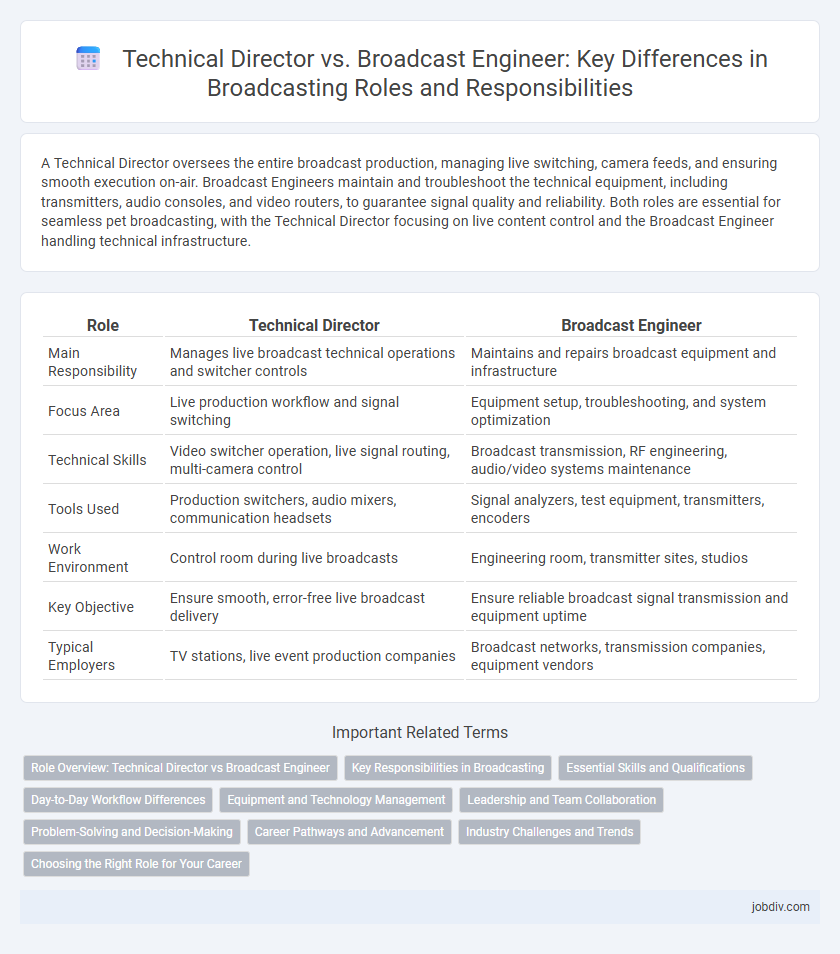A Technical Director oversees the entire broadcast production, managing live switching, camera feeds, and ensuring smooth execution on-air. Broadcast Engineers maintain and troubleshoot the technical equipment, including transmitters, audio consoles, and video routers, to guarantee signal quality and reliability. Both roles are essential for seamless pet broadcasting, with the Technical Director focusing on live content control and the Broadcast Engineer handling technical infrastructure.
Table of Comparison
| Role | Technical Director | Broadcast Engineer |
|---|---|---|
| Main Responsibility | Manages live broadcast technical operations and switcher controls | Maintains and repairs broadcast equipment and infrastructure |
| Focus Area | Live production workflow and signal switching | Equipment setup, troubleshooting, and system optimization |
| Technical Skills | Video switcher operation, live signal routing, multi-camera control | Broadcast transmission, RF engineering, audio/video systems maintenance |
| Tools Used | Production switchers, audio mixers, communication headsets | Signal analyzers, test equipment, transmitters, encoders |
| Work Environment | Control room during live broadcasts | Engineering room, transmitter sites, studios |
| Key Objective | Ensure smooth, error-free live broadcast delivery | Ensure reliable broadcast signal transmission and equipment uptime |
| Typical Employers | TV stations, live event production companies | Broadcast networks, transmission companies, equipment vendors |
Role Overview: Technical Director vs Broadcast Engineer
The Technical Director manages the live production control room, orchestrating camera feeds, video switchers, and on-air graphics to ensure seamless broadcast delivery. Broadcast Engineers focus on maintaining and troubleshooting the entire transmission chain, including signal flow, audio/video equipment, and broadcast infrastructure for optimal performance. Both roles collaborate closely to guarantee high-quality broadcast output but differ in hands-on live production versus technical system management.
Key Responsibilities in Broadcasting
The Technical Director oversees the overall production workflow, managing live broadcasts, switching video sources, and coordinating technical crew to ensure seamless transmission. Broadcast Engineers handle the maintenance, troubleshooting, and optimization of broadcasting equipment, including transmitters, encoders, and signal processors, ensuring signal integrity and compliance with technical standards. Both roles are crucial for delivering high-quality broadcasts, with the Technical Director focusing on live production control and the Broadcast Engineer ensuring the technical infrastructure operates efficiently.
Essential Skills and Qualifications
A Technical Director in broadcasting must excel in live production control, video switcher operation, and crew coordination, often requiring proficiency with automation systems and real-time decision-making under pressure. Broadcast Engineers focus on maintaining and troubleshooting transmission equipment, signal flow, and studio hardware, demanding strong technical knowledge in RF systems, audio/video encoding, and network infrastructure. Both roles necessitate a deep understanding of broadcasting technology, but Technical Directors emphasize creative management skills, while Broadcast Engineers prioritize technical expertise and equipment maintenance.
Day-to-Day Workflow Differences
Technical Directors oversee live production operations, managing switchers, graphics, and camera feeds to ensure seamless broadcast execution. Broadcast Engineers focus on maintaining, troubleshooting, and upgrading transmission equipment, signal paths, and broadcast infrastructure to optimize broadcast quality. While Technical Directors operate in the live control room environment directing real-time content, Broadcast Engineers work primarily behind the scenes maintaining technical systems and resolving engineering issues.
Equipment and Technology Management
Technical Directors oversee live production equipment, ensuring seamless integration of video switchers, audio mixers, and graphics systems for real-time broadcast control. Broadcast Engineers specialize in maintaining and optimizing transmission technology, including satellite uplinks, encoding hardware, and signal processing equipment to guarantee broadcast quality and reliability. Both roles require expertise in advanced broadcasting technology, but Technical Directors focus on live production workflows while Broadcast Engineers manage the technical infrastructure behind signal distribution.
Leadership and Team Collaboration
A Technical Director in broadcasting leads live production crews, making real-time decisions to ensure seamless broadcast execution, while a Broadcast Engineer focuses on maintaining and troubleshooting the technical infrastructure behind the scenes. The Technical Director excels in team collaboration by coordinating camera operators, audio engineers, and other crew members to achieve a unified production vision. Broadcast Engineers support leadership roles by providing technical expertise and resolving issues promptly, enabling smooth operations and minimizing downtime during broadcasts.
Problem-Solving and Decision-Making
Technical Directors excel in real-time problem-solving during live broadcasts, making immediate decisions to ensure seamless production quality. Broadcast Engineers focus on troubleshooting and maintaining broadcast equipment, developing long-term solutions to technical issues. Both roles require advanced technical knowledge, but Technical Directors prioritize on-the-spot decisions while Broadcast Engineers emphasize preventative and systematic problem resolution.
Career Pathways and Advancement
Technical Directors typically advance by gaining expertise in live production management and mastering control room technologies, positioning themselves for roles like senior technical director or broadcast operations manager. Broadcast Engineers focus on maintaining and optimizing broadcast equipment and infrastructure, progressing toward senior engineer positions or broadcast engineering management. Both career pathways emphasize technical proficiency but differ as Technical Directors lean toward production oversight, while Broadcast Engineers concentrate on equipment and systems maintenance.
Industry Challenges and Trends
Technical Directors oversee live broadcast operations ensuring seamless production quality, while Broadcast Engineers handle the installation, maintenance, and troubleshooting of complex broadcast equipment. Industry challenges include adapting to IP-based workflows, integrating AI-driven automation, and ensuring cybersecurity in increasingly digital broadcast environments. Emerging trends highlight the shift towards remote production and cloud-based broadcast infrastructure, necessitating cross-disciplinary expertise between Technical Directors and Broadcast Engineers.
Choosing the Right Role for Your Career
Technical Directors oversee live production workflows, managing camera switching, graphics, and audio during broadcasts to ensure seamless on-air delivery. Broadcast Engineers focus on maintaining and troubleshooting transmission equipment, signal paths, and broadcast infrastructure to guarantee consistent signal quality. Selecting between these roles depends on whether you prefer hands-on live production coordination as a Technical Director or the technical maintenance and engineering of broadcast systems as a Broadcast Engineer.
Technical Director vs Broadcast Engineer Infographic

 jobdiv.com
jobdiv.com